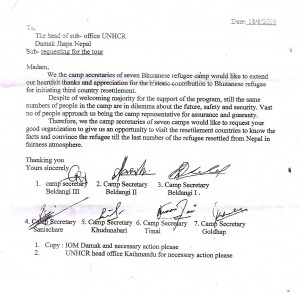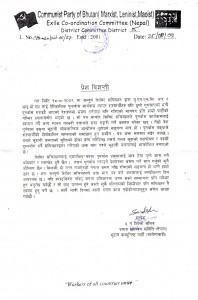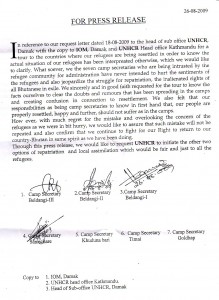It was just two weeks ago that some Bhutanese political leaders in exile rushed to Nepal’s Ministry of Home Affairs seeking political asylum and personal security. Their complaint was that they were not allowed to operate political activities freely in Nepal and felt very insecure.

Personal security is important for all individuals, including refugees, to survive. But their demands were pushed to the government of Nepal when an underground outfit, the Liberation Army of Bhutan, distributed pamphlets in the refugee camps in east Nepal on July 15. These wide-spread pamphlets threatened the political parties of physical action should they fail to initiate the necessary steps towards repatriating the Bhutanese refugees.
Warnings
Logically, it is not bad to warn them to energize and activate the exiled leaders, most of whom stand against resettling the refugees abroad and want to keep them in the camps for some more years. When initiatives towards repatriation are showing some promise, such warnings are likely. However, warning of physical action against them is a matter of serious concern in a fragile host country like Nepal where refugees are liable to follow the law of the land.
Rajan Bhattarai, who is the foreign affairs advisor to Nepalese Prime Minister Madhav Kumar Nepal, questions the motive of the refugee leaders and wants this issue discussed seriously. “They have asked for political asylum and security after 18 years of their stay in Nepal,” he said. (Listen to Rajan Bhattarai)
If the Nepalese bureaucrats share the same sentiments as Bhattarai, the exiled political parties have certainly created confusion in Nepal as to what they really want.
On the other side, camp secretaries from all the seven camps have requested the United Nations High Commissioner for Refugees (UNHCR) and the International Organisation for Migration (IOM) to arrange their trips to countries where their fellow-countrymen are being resettled.
In a letter addressed to the UNHCR and IOM on August 18, the secretaries said, “Give us an opportunity to visit the resettlement countries to know the facts, and convince the refugees till the last refugee gets resettled from Nepal.”
They trumpeted that a vast number of refugees in the camps who voted for them during the camp management elections approached them seeking assurance and guarantee while opting for resettlement. According to them, the third country resettlement programme is a historic opportunity for the Bhutanese refugees. However, they forgot to mention that there are also refugees in the camps who can never accept resettlement at any cost and will rather choose to remain in the camps until the doors back home are open.
An interesting thing that needs mention here is that the Communist Party of Bhutan (Marxist-Leninist-Maoist) was not happy with the decision of the camp secretaries. The party’s coordination committee in exile on August 25 sent a circular to the local media asking the camp secretaries to withdraw their decision to visit the resettling countries. According to the party’s statement, the resettlement programme is aimed at tarnishing the ‘democratic’ struggle in

Bhutan, and is only a temporary relief for the refugees in the camps.
For sure, this statement brought changes in the thinking of the camp secretaries. The following day, they wrote to both the UNHCR and IOM that they had taken such a decision in haste and regretted over it. They even lamented that they would continue to look after the camp businesses and keep on fighting for their right to return home. This time, they have not told the UNHCR to arrange trips to America or other countries, but made requests to initiate other options – local integration or repatriation, which, according to them, are the demands of the refugees.
What I want to stress here is that the political parties and other organisations formed and operating in exile must respect the sentiments of all the Bhutanese citizens, inside Bhutan or outside. History has shown that during movements carried out in exile, these refugee leaders remained mum when the whole community wanted them to speak. Hundreds of refugees left their huts to resettle abroad without knowing its pros and cons since their leaders did not say what was a better option – to stay in Nepal until repatriation takes place or go for resettlement. Instead, the laymen in the camps heard their leaders opposing the resettlement programme while sending their family members and relatives across the seas.
The camp secretaries elected by the refugees also did not furnish information about the resettlement programme when it was just announced. They chose to take a safer side by saying individual refugees needed to make independent decisions. Indeed, it is sad to know that the camp secretaries want to make luxurious trips to study the real situations abroad, where the resettled refugees are having a hard time due to lack of employment opportunities and the difficulty of adjusting in a new community.
when it was just announced. They chose to take a safer side by saying individual refugees needed to make independent decisions. Indeed, it is sad to know that the camp secretaries want to make luxurious trips to study the real situations abroad, where the resettled refugees are having a hard time due to lack of employment opportunities and the difficulty of adjusting in a new community.
Resettlement option
These people’s representatives had said that they wanted to assist the UNHCR in resettling all the refugees. My concern here is, what right do these secretaries have to force all the Bhutanese in the camps to go for resettlement when there are thousands of refugees unwilling to choose this option? Instead, they can urge the concerned authorities to keep all three options open so that each refugee can make his own decision.
Note: The article is reproduced from The Rising Nepal of September 1, 2009.




